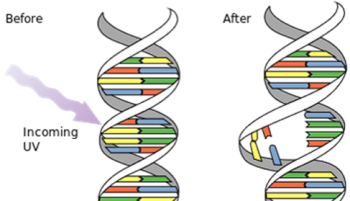Serendip is an independent site partnering with faculty at multiple colleges and universities around the world. Happy exploring!
UV, Mutations, and DNA Repair
 Students learn about the effects of UV light, mutations and DNA repair on the survival of prokaryotes and the risk of skin cancer. In the first experiment, students evaluate the effects of different durations of UV exposure on survival and population growth of Haloferax volcanii. This experiment also tests for photorepair of DNA damage. Students design the second experiment, which evaluates the effectiveness of sunscreen. In addition, students answer analysis and discussion questions that promote their understanding of molecular biology, cancer, and the interpretation of experimental results.
Students learn about the effects of UV light, mutations and DNA repair on the survival of prokaryotes and the risk of skin cancer. In the first experiment, students evaluate the effects of different durations of UV exposure on survival and population growth of Haloferax volcanii. This experiment also tests for photorepair of DNA damage. Students design the second experiment, which evaluates the effectiveness of sunscreen. In addition, students answer analysis and discussion questions that promote their understanding of molecular biology, cancer, and the interpretation of experimental results.
 Download Student Handout: PDF format or Word format
Download Student Handout: PDF format or Word format
Download Teacher Preparation Notes: PDF format or Word format
The Teacher Preparation Notes provide instructional suggestions and background information and explain how this activity is aligned with the Next Generation Science Standards. As mentioned in the Teacher Preparation Notes, the primary version of the Student Handout is designed for use with high school students. Another version, designed for use with university students, is provided in the attachments below.
We invite comments on this Hands-On Activity and the accompanying Teacher Preparation Notes, including suggestions for other teachers who are planning to use the activity or any questions or comments you have related to the activity. If you would prefer to send your comments or questions in a private message, please write Ingrid Waldron at iwaldron@sas.upenn.edu.
| Attachment | Size |
|---|---|
| HaloferaxUVUnivProtocol.docx | 5.4 MB |
| HaloferaxUVUnivProtocol.pdf | 828.79 KB |










Comments
Haloferax volcanii
Hi,
Thank you for all of your wonderful activities!
I'm having a difficult time finding Haloferax volcanii to purchase. (It is discontinued from the supplier recommended in the protocol, as well as from other suppliers I have looked at.) Can you suggest a different microorganism for this?
Thank you!
Haloferax supply
Thank you for alerting us that this problem has still not been resolved. Dr. Pohlschroder has been working with the supplier to resolve the problem, so it is helpful to know that you are still having trouble getting Haloferax. For now, please contact Dr. Pohlschroder (pohlschr@sas.upenn.edu) and she will provide you with Haloferax volcanii.
Ingrid
Thank you so much!
Thank you so much!
Post new comment